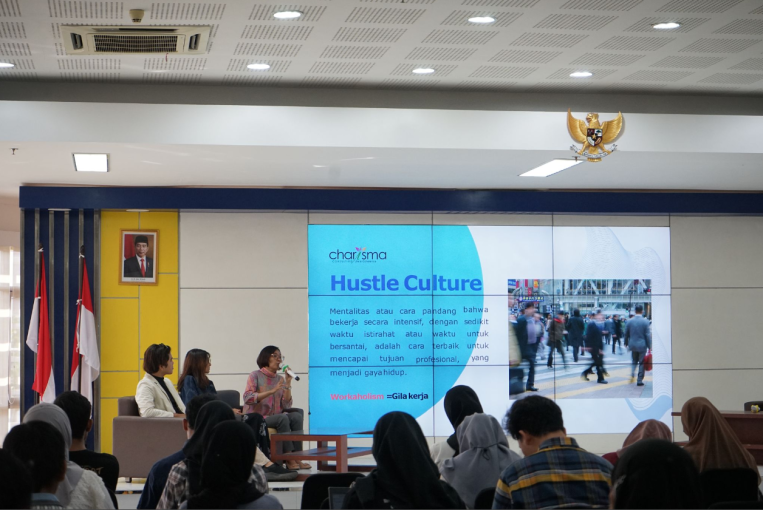
Yogyakarta, October 11th 2023─CDC FISIPOL UGM welcomed World Mental Health Day on October 10 by holding a series of activities through Mental Health Society 2023. A talk show themed “No Hustle, No Future: How to Develop Resilience in A Hustle Culture” opened the week of health events held on Wednesday (11/10) at Fisipol Auditorium. Through the talk show attended by Clinical Psychologist – Ernawati Widyaningsih, M.Psi., Psychologist, Mother of Bhumi Bhuvana – Bukhi Prima Putri, and mental health fighter – Maygsi Suwadi, S.Sos., M.A. CDC invited them to better understand mental health.
Mental Health Society has been held since 2019 right on World Mental Health Day, October 10 and aims to invite people to care more about mental health issues. The Mental Health Society agenda, which is in line with SDGs 3 (Healthy and Prosperous Life) this year, starts with Talkshow, Meronce Spot, Afternoon Yoga at FISIPOL , Spill The Tea: Tea Time & Pop Up Artisan Tea, and closed with Catharsis: Let’s Tell Stories.
Through this year’s theme, “No Hustle, No Future? How to Develop Resilience in A Hustle Culture” reviews the hustle culture that is currently trending among the younger generation. Hustle culture is a mentality or perspective that is cultured and becomes a lifestyle, or in the past, it was called workaholic.
“There is an addiction that cannot be controlled so that working time exceeds its limits, there is a thought that it must be productive,” Erna explained.
The impact of hustle culture according to Erna can be seen through four aspects, namely how to think, how to feel, and how to behave, which are then reflected through social interactions. Such as rumination of thoughts that can become toxic, feelings of inferiority and guilt, becoming apathetic, to feelings of overwhelmedness and burnout that can trigger anxiety to depression.
Hustle culture is growing and has led to phenomena such as toxic productivity, which is the drive to constantly “produce” or “do something” and results in productivity as a poison. As a result, people feel guilty when they are not productive or do not do and produce something. Whereas it would be better to prioritize quality over quantity when choosing priorities to do.
Bukhi, as someone who has experienced mental health issues, shared the steps she took during his recovery. Such as conducting self observation without judgment, exploring by asking yourself questions, interacting with friends or participating in mental health seminars, taking action with journaling, and evaluating the process that has been done.
“Sometimes we need to try to be ‘quiet’, to meet ourselves and not other people. Get rid of the noise to find out what we want,” explains Bukhi. Bukhi also added that other activities such as cleaning, gardening, and eating healthy and clean food can support better mental health.
Meanwhile, as a mental health fighter until now, Maygsi shared the efforts made when dealing with professional activities such as work. Among them are completing work when you are in a good mood, creating a productive environment and reducing distractions, breaking goals into small steps so that they don’t feel the heaviness, surrounding yourself with people who encourage self-development, and balancing personal well-being with your work (work-life balance).
Also, keep in mind that hustle culture is not a diagnosis but a phenomenon. For friends who find it difficult, don’t be afraid to ask for help from professionals such as psychologists or psychiatrists. Through CDC FISIPOL, the academic community of FISIPOL UGM has the right to access mental health services such as consultation with peer-counselors and CDC psychologists.
